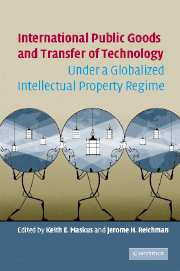Book contents
- Frontmatter
- Contents
- List of contributors
- Preface
- PART I International Provision of Public Goods under a Globalized Intellectual Property Regime
- PART II Innovation and Technology Transfer in a Protectionist Environment
- PART III Sectoral Issues: Essential Medicines and Traditional Knowledge
- PART IV Reform and Regulation Issues
- 22 Issues Posed by a World Patent System
- 23 Intellectual Property Arbitrage: How Foreign Rules Can Affect Domestic Protections
- 24 An Agenda for Radical Intellectual Property Reform
- Comment: Whose Rules, Whose Needs? Balancing Public and Private Interests
- 25 Diffusion and Distribution: The Impacts on Poor Countries of Technological Enforcement within the Biotechnology Sector
- 26 Equitable Sharing of Benefits from Biodiversity-Based Innovation: Some Reflections under the Shadow of a Neem Tree
- 27 The Critical Role of Competition Law in Preserving Public Goods in Conflict with Intellectual Property Rights
- 28 Expansionist Intellectual Property Protection and Reductionist Competition Rules: A TRIPS Perspective
- 29 Can Antitrust Policy Protect the Global Commons from the Excesses of IPRs?
- Comment I: Competition Law as a Means of Containing Intellectual Property Rights
- 30 “Minimal” Standards for Patent-Related Antitrust Law under TRIPS
- Comment II: Competitive Baselines for Intellectual Property Systems
- 31 WTO Dispute Settlement: Of Sovereign Interests, Private Rights, and Public Goods
- 32 The Economics of International Trade Agreements and Dispute Settlement with Intellectual Property Rights
- 33 Intellectual Property Rights and Dispute Settlement in the World Trade Organization
- 34 WTO Dispute Resolution and the Preservation of the Public Domain of Science under International Law
- 35 Recognizing Public Goods in WTO Dispute Settlement: Who Participates? Who Decides? The Case of TRIPS and Pharmaceutical Patents Protection
- Index
Comment: Whose Rules, Whose Needs? Balancing Public and Private Interests
Published online by Cambridge University Press: 05 May 2010
- Frontmatter
- Contents
- List of contributors
- Preface
- PART I International Provision of Public Goods under a Globalized Intellectual Property Regime
- PART II Innovation and Technology Transfer in a Protectionist Environment
- PART III Sectoral Issues: Essential Medicines and Traditional Knowledge
- PART IV Reform and Regulation Issues
- 22 Issues Posed by a World Patent System
- 23 Intellectual Property Arbitrage: How Foreign Rules Can Affect Domestic Protections
- 24 An Agenda for Radical Intellectual Property Reform
- Comment: Whose Rules, Whose Needs? Balancing Public and Private Interests
- 25 Diffusion and Distribution: The Impacts on Poor Countries of Technological Enforcement within the Biotechnology Sector
- 26 Equitable Sharing of Benefits from Biodiversity-Based Innovation: Some Reflections under the Shadow of a Neem Tree
- 27 The Critical Role of Competition Law in Preserving Public Goods in Conflict with Intellectual Property Rights
- 28 Expansionist Intellectual Property Protection and Reductionist Competition Rules: A TRIPS Perspective
- 29 Can Antitrust Policy Protect the Global Commons from the Excesses of IPRs?
- Comment I: Competition Law as a Means of Containing Intellectual Property Rights
- 30 “Minimal” Standards for Patent-Related Antitrust Law under TRIPS
- Comment II: Competitive Baselines for Intellectual Property Systems
- 31 WTO Dispute Settlement: Of Sovereign Interests, Private Rights, and Public Goods
- 32 The Economics of International Trade Agreements and Dispute Settlement with Intellectual Property Rights
- 33 Intellectual Property Rights and Dispute Settlement in the World Trade Organization
- 34 WTO Dispute Resolution and the Preservation of the Public Domain of Science under International Law
- 35 Recognizing Public Goods in WTO Dispute Settlement: Who Participates? Who Decides? The Case of TRIPS and Pharmaceutical Patents Protection
- Index
Summary
This comment is a broad personal reflection on some major issues arising in the world of intellectual property (IP) today. It is based on my experiences over the past few years, especially with the Quaker United Nations Office (QUNO) in Geneva.
Background
Fundamentally, I came to see that IP rules matter because they increasingly affect the distribution of power and wealth and determine the roups that drive and control the direction and pace of change and the dimensions of the space within which we all work and exist. I have always remembered a Wizard of ID cartoon from years ago in which the King says “he who make the rules gets the gold.” And that, in essence, is what today's IP rules are about.
The globalized rules on IP are part of a broader rewriting of the rules of the world, a development I first came to understand through my work on the global food system. At the heart of this reformation lie issues of power and control, risks and benefits – who has what power to control their part of the system and thereby to minimize risks and maximize benefits. Two key trends are evident in the food system, for example. One is an increasing concentration of economic power within any sector. The other is use of various tools by the different actors in the system (input suppliers, farmers, traders, manufacturers, processors, distributors, retailers, caterers) to maximize control of the operations they perform as much as possible.
- Type
- Chapter
- Information
- International Public Goods and Transfer of Technology Under a Globalized Intellectual Property Regime , pp. 662 - 668Publisher: Cambridge University PressPrint publication year: 2005



